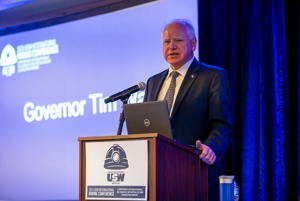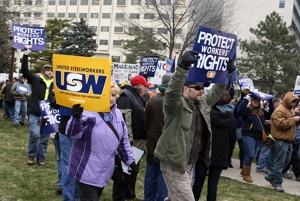Blink, And You ll Miss The Latest Libertarian Moment
Draper’s engaging in wishful thinking. Young voters were an important part of the diverse coalition that gave President Obama two terms — but just one part. They’re not a monolithic bloc, even within Obama’s “multi-American” coalition. They encompass every demographic group within that coalition. Individually, many share “dual membership” in other groups — including Latinos, African-Americans, Asian-Americans, women, and LGBT Americans. Obama’s 60 percent of the youth vote in 2012, overlaps with his even-wider margins of victory in other groups.
As conservative David Frum points out, young voters are not libertarian. They’re not even “trending” that way. Frum writes that every serious political analysis of under-30 voters has found them to be “the most pro-government age group” since the group that lived through the Great Depression. “Young voters are more likely than their elders to believe that government should intervene in the economy to create jobs,” Frum writes. “They support government aid to education and healthcare more than any other age group.”
Statistics from the Populist Majority website underscore Frum’s point:
- 82% of millennials support increasing funding for public education.
- 76% of millennials want the government to be more involved in protecting the environment from pollution.
- 72% of millennials believe the wealthy in America take in too much of our national income, and the middle class and poor get too little.
- 72% of millennials want the government to be more involved in the economy.
- 84% of millennials support creating subsidized jobs for low-income and long-term unemployed workers.
- 61% of Millennials view Medicare favorably.
- 76% of millennials want the government to be more involved in providing retirement security for seniors.
- 74% of millennials want to raise taxes on people earning over $250,000 a year.
- 69% of millennials favor enacting the “Buffet Rule,” a requirement that people making over $1 million a year pay at least 30% of their income in taxes.
- 76% of millennials favor increasing the minimum wage to $10 an hour over the next couple years.
- 76% of millennials want the government to be more involved in protecting consumers and workers.
- 64% of Millennials support federal aid programs, such as food stamps.
Hardly sounds like the “wild card” constituency of Draper’s dreams.
In 2010, when another “Libertarian Moment” loomed, Christopher Beam wrote in New York Magazine that Libertarians hadn’t been so close to power since 1776, and explained why its as close as they’re likely to get: the unbending libertarian ideal proves breakable the moment it’s applied to real life. “Libertarianism,” Beam writes, “is a clunky word for a simple, elegant idea: that government should do as little as possible.” An elegant idea in the abstract, perhaps, but “the foundation starts to crumble” the moment it’s applied to real life.
Paul Krugman notes that the perfect storm behind Toledo, Ohio’s water crisis is a good example of real-life application of the “libertarian fantasy.” Krugman recalled hearing RedState founder Erick Erickson blast government regulations so oppressive that citizens might want to “march down to their state legislator’s house, pull him outside, and beat him to a bloody pulp.” Erickson raged against a ban on phosphorus in dishwashing detergents.
The crisis in Toledo, caused by phosphorus in unregulated agricultural pollution, illustrates how Libertarians’ “elegant” ideal really plays out. Conservatives in federal and state government weakened existing environmental protections. Meanwhile, the lobbying arm of the fertilizer and agriculture industry, fought against regulation of phosphorus in agricultural runoff, leaving Toledo residents unable to trust the very tap water coming into their homes.
Regulating pollution is just one example. Libertarians’ “elegant idea” ensures there’s no federal government strong enough to do any of the things America’s populist majority wants government to do; leaving Americans to fend for themselves against environmental pollution, natural disasters, and the whims of the one percent. Libertarians may be having a “moment,” but when voters understand what its “elegant ideas” mean for their day-to-day lives, the “Libertarian Moment” will be over in a flash.
***
This has been reposted from the Campaign for America’s Future.
By clicking Sign Up you're confirming that you agree with our Terms and Conditions.
Related Blogs
Ready to make a difference?
Are you and your coworkers ready to negotiate together for bigger paychecks, stronger benefits and better lives?

